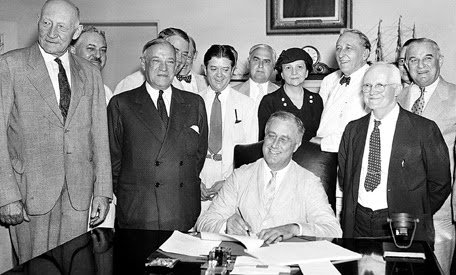 |
| Secretary Perkins stands behind President F.D. Roosevelt as he signs the Social Security Act |
Our season-closing show, American Night: the Ballad of Juan José sheds lights on some of lesser known moments and figures in the history of the country. Frances Perkins is not portrayed on stage, but on the 135th anniversary of her birth, we take a look at the extraordinary life and contributions of the first female US Cabinet member.
Perkins (née Fannie Coralie Perkins) was by all accounts a woman with a remarkable life, being named Secretary of Labor little more than a decade after women were granted the right to vote, and she remains the longest individual to serve in that position. The cabinet appointment also made her the first woman with the possibility of succeeding the president in case of death, removal or resignation. An intellectual juggernaut, she earned a B.A. in chemistry and physics from Mount Hollyoke College, and a master’s degree in political science from Columbia University. She also studied economics and sociology at the University of Pennsylvania. Before venturing into government, she taught at several institutions, including chemistry at the prestigious prep school Lake Forest Academy (then called Ferry Hall School) and sociology at Adelphi College. After her career in government, she would become a teacher and lecturer at Cornell University until her death in 1965.
A progressive activist, she volunteered during during the settlement house movement, an equity initiative seeking to integrate lower, middle and upper classes within the same neighborhoods. After witnessing the deadliest industrial disaster in the history of New York, she increased her efforts investigating and improving workplace conditions, which she had been engaged in as part of the New York Consumers League. When Franklin D. Roosevelt was elected governor of New York, he appointed her as the first Commissioner of Labor for the state. Upon his election to the presidency, he brought her to Washington, D.C. and into his cabinet. As Secretary of Labor, she would be instrumental in the development and establishment of much of the New Deal and a long list of labor protections we now take for granted, including: regulations for working women and children; federal policies to work with labor unions; minimum wage, overtime and unemployment insurance laws.
The even lesser known part of the story is heart-breaking in its personal details. In 1910, she had married economist Paul Caldwell Wilson, and sued successfully to retain her birth name. Wilson was institutionalized throughout much of their marriage, and the tradition of a cabinet member entertaining at home with his spouse as gracious host found an unusual form in her case. She had developed a relationship and shared a Georgetown home with railroad heiress Mary Harriman Rumsey, who gladly performed the role of hostess for Perkins’s guests.
Secretary Perkins was at the height of creating the framework for what would become the Social Security Act when Rumsey died of complications after falling from a horse. Despite quietly mourning her companion, she soldiered on, calling the cabinet that same week to her home to hammer out the details of the groundbreaking legislation; she «sat a bottle of Scotch on the table, and announced that no one would leave that night until the work was done.» Soon after that, she would have to leave the home she had shared with Rumsey, since it was the deceased’s resources that had made renting the place possible.
In a revisionist move like those that American Night seeks to counter, in 2011 the conservative governor of her birth state of Maine, Paul LePage, ordered a mural depicting Perkins removed, as well as the renaming of her a conference room at the state’s Department of Labor honoring this American hero.
Come be a part of this wild romp through more of our history that some may ignore or want to. American Night: the Ballad of Juan José runs April 30 through May 23, but you can be among the first to see our production by ushering at pre-previews, starting on April 24!

